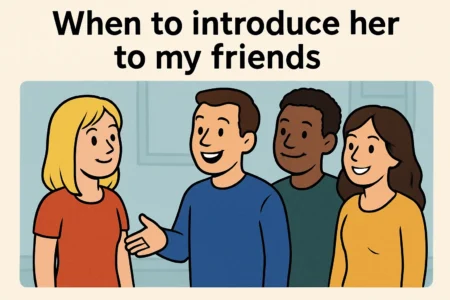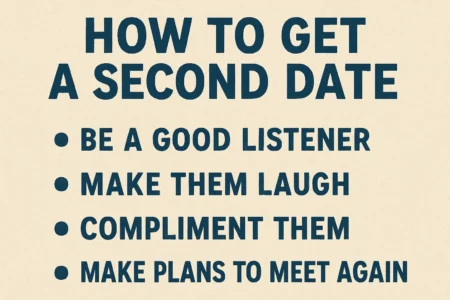Let’s be real: first dates are weird. They’re this strange mix of high hopes and a healthy dose of “what if this is a total waste of my time?” You go in hoping for witty banter and a spark, but sometimes, you get something else entirely. A sinking feeling in your gut. You start to notice little things—weird comments, off-putting habits—that make you want to check your watch. Listen up. Those are the critical first date red flags, and your intuition is screaming at you to pay attention.
We’ve all been in that exact seat, trying to figure out if the person across from us is worth a second date, or even a second thought. The pressure is intense. It’s so easy to brush off that flicker of unease as just “first date jitters.” It’s tempting to make excuses for behavior that feels, well, off. But ignoring those early warning signs is like putting tape over your car’s “check engine” light.
Sure, you might make it a little further down the road, but you’re heading for a breakdown. Learning to see and trust these red flags isn’t about being cynical. It’s about being smart with your time and energy. It’s about valuing yourself enough to walk away from a bad situation before it really even starts.
More in Date Etiquette and Early Stages Category
Key Takeaways
- Trust Your Gut: If you leave a date feeling drained, anxious, or just plain weird, that feeling is the biggest red flag of all, no matter the reason.
- Watch How They Treat People: How your date acts toward service staff reveals their true character much faster than any sweet words they say to you.
- Listen for Accountability: The way someone talks about their past, especially their exes, tells you everything. A person who blames everyone else for their problems is probably not ready for a healthy relationship.
- Boundaries Are Everything: Anyone who tries to push your boundaries—physical, emotional, or otherwise—on a first date is showing you they won’t respect them later, either.
- It Takes Two to Talk: If your date only talks about themselves, they aren’t looking for a partner. They’re looking for an audience.
How Do They Treat the Waiter?
This might be the oldest trick in the dating handbook, but it’s still the gold standard for a reason. Seriously, just watch. How your date interacts with the host, the bartender, or the server is a free preview of their core character. Are they polite? Do they make eye contact and say “please” and “thank you”? Or are they acting like they’re the most important person in the room—dismissive, impatient, or just plain rude?
This has nothing to do with being formal. It has everything to do with basic human respect. When someone is condescending to a person they think is “beneath” them, they’re showing you a massive lack of empathy and a gross sense of entitlement. They’re showing you how they act when they think no one’s looking.
It’s a crystal-clear glimpse into how they might treat you someday.
I once went out with a guy who was perfectly charming—at first. He was good-looking, funny, and smart. But the second the waitress approached our table, a switch flipped. He didn’t look at her. He cut her off mid-sentence. Later, to my absolute horror, he snapped his fingers to get her attention. My stomach dropped. It was so ugly and completely unnecessary. With that one gesture, he told me everything I needed to know. He saw the world in terms of who was important and who wasn’t. I knew right then, with 100% certainty, that a second date was never happening. I paid for my half, walked out, and felt like I’d just swerved to miss a ten-car pileup.
Is Their Phone More Interesting Than You?
You’re right in the middle of telling a great story, and you see their eyes drift down. They’re looking at the glowing screen in their lap. Or maybe the phone is right there on the table between you, buzzing and lighting up like a constant distraction. We all live on our phones, so a quick check might seem innocent, but on a first date, it’s a huge red flag.
When someone can’t disconnect for a couple of hours to focus on you, they’re sending a loud and clear message: you aren’t the priority here. They aren’t really present. It screams disrespect for your time and a genuine lack of interest in actually building a connection. Frankly, it can also point to bigger issues, like a serious lack of impulse control or a full-blown phone addiction.
But What if It’s an Emergency?
Look, life is messy. There is a massive difference between someone who says, “Hey, so sorry, my sitter might text, so I need to keep my phone out,” and someone who is just mindlessly doom-scrolling while you talk. One is respectful communication. The other is a habit of checking out. A grown adult can and should let you know if they’re expecting an important call or message. If they’re truly interested in you, that phone will be out of sight or, at the very least, flipped over. If it isn’t, they’re showing you that their digital life will always win out over their real one.
Are They a Little Too Into You, a Little Too Soon?
It starts with a firehose of compliments. “You are literally the most amazing person I have ever met.” Then, it escalates. Fast. “I’ve never felt a connection like this with anyone.” Before you’ve even decided on an appetizer, they’re already talking about a trip you two should take next month. At first, it can feel amazing, like you’ve suddenly become the main character in a romance movie. But this isn’t romance.
It’s a manipulation tactic known as “love bombing.”
This kind of intense, over-the-top flattery from a virtual stranger is a massive red flag. Real, healthy connections build over time, based on actually getting to know each other. Love bombing is designed to overwhelm you and short-circuit your natural defenses. It makes you feel special and indebted to them, which gives them control. It’s a classic move for narcissistic or manipulative personalities. They aren’t falling for you. They’re falling for an idea of you, and they’re trying to lock you down before you see who they really are.
Isn’t It Just Old-Fashioned Romance?
It’s so important to know the difference between real chemistry and love bombing. Genuine chemistry is exciting, sure, but it also feels mutual and comfortable. You feel like the other person actually sees and hears you. Love bombing, however, feels more like a performance. The compliments are often generic and over-the-top, focused more on how you make them feel. It’s a dizzying rush, but it’s built on nothing. Someone who is genuinely interested will show it by asking you thoughtful questions, not by planning your future together after thirty minutes.
Do They Even Bother Asking You Questions?
You take a seat, ready for a good conversation, but quickly realize the conversation is a one-way street. Your date launches into an endless monologue about their job, their gym routine, their ex, their brilliant analysis of a TV show you’ve never watched. They might pause, but only to take a breath before diving into the next story about themselves. An hour ticks by, and it hits you: you know their entire life history, but they don’t even know what you do for work.
Welcome to the monologue date. It’s one of the most common and telling first date red flags out there. A person who asks you zero questions is showing you that they have zero interest in who you are as a person. They didn’t come to get to know you. They came to perform for an audience. This points to a level of self-absorption that won’t just disappear in a relationship. A real partnership is a two-way street that requires both talking and listening. Someone who only knows how to talk is proving they can’t handle their side of the road.
What if They’re Just Nervous?
Nerves are real, and sometimes people talk a lot when they’re anxious. That’s a fair point. But there’s a huge difference between a nervous rambler and a pure narcissist. A nervous person will eventually catch themselves. They’ll have a moment of awareness and say something like, “Oh my god, I am talking so much, I’m so sorry! I’m a little nervous. Anyway, tell me about you.” They show they’re aware of the dynamic and try to fix it. A truly self-absorbed person never has that moment. The thought that the conversation should be about anyone else never even crosses their mind.
How Do They Talk About Their Ex?
At some point, the ex-files are bound to be opened. This moment is a treasure trove of information. You’re not looking for juicy gossip; you’re listening for signs of emotional maturity and self-awareness. Trust me, the way someone talks about their exes tells you infinitely more about them than it does about their past partners.
Keep your ears open for these major red flags:
- The “All My Exes Are Crazy” Story: If every single one of their past partners was “crazy,” “a psycho,” or “unstable,” you should run for the hills. It is highly unlikely they have a magical ability to only attract unhinged people. The common denominator in all those failed relationships is them. This is a classic sign of someone who refuses to take any responsibility for their own actions.
- Zero Personal Accountability: Do they talk about their breakups like they were innocent bystanders in a series of unfortunate events? Do they blame the other person for everything? A mature person can look back and admit their own faults. Someone who takes no accountability is showing you that they haven’t learned a single thing from their past and are doomed to repeat it.
- Lingering Bitterness and Anger: It’s normal to still have some feelings, but if they’re spitting venom about someone they dated years ago, it means they are emotionally stuck. They’re carrying around a ton of unresolved baggage, and that bitterness will absolutely poison any new relationship they start.
I remember this one date where the guy went on a twenty-minute tirade trashing his ex-girlfriend. He critiqued everything about her, from her friends to the way she loaded the dishwasher. It was so uncomfortable, but also so incredibly revealing. It wasn’t just that he was being a jerk; he was showing a complete inability to look inward. I realized in that moment that if we ever dated and broke up, I would just be the next “crazy ex” in his long list of stories. He wasn’t just sharing his past; he was showing me my future.
Are They Pushing Your Boundaries Already?
Boundaries are those invisible lines we all have that protect our physical space, our emotions, and our peace of mind. A decent, respectful person will pick up on those lines and honor them, especially with someone they just met. A person who pushes your boundaries on a first date is waving a red flag the size of a billboard.
This isn’t always super obvious or aggressive. It can be subtle. Maybe they slide into the booth right next to you instead of sitting across from you, making you feel crowded. Maybe they put a hand on your leg and leave it there even after you’ve shifted away. It could be them pressuring you to have “just one more drink” after you’ve already said you’re ready to go home. Or maybe they ask questions that are way too personal for a first date, completely ignoring your obvious discomfort.
When someone ignores a small, polite “no,” they’re testing the waters. They’re trying to see if you’re someone whose boundaries they can easily bulldoze. As stated by the University of California, Berkeley’s Greater Good Science Center, setting and maintaining healthy boundaries is essential for self-respect and healthy relationships. Someone who shows you on day one that your “no” is merely a suggestion is giving you a terrifying preview of a future where your comfort doesn’t matter.
Is Every Other Word a Complaint?
You ask a simple question, like “How was your day?” and you get a ten-minute monologue about their awful commute, their idiot boss, and their annoying coworkers. They complain that the restaurant is too loud. They complain that their drink is too weak. Every story they tell features a long list of people who have wronged them.
Look, everyone has bad days. We all need to vent. But there is a world of difference between sharing a momentary frustration and living in a state of constant negativity. A person who does nothing but complain is broadcasting their misery for all to see. Not only is that incredibly draining to be around, but it also points to a deep-seated victim mentality. In their world, life is just a series of bad things that happen to them. This makes for an absolutely exhausting partner. You’ll either be forced into the role of their 24/7 therapist or, eventually, you’ll just become one more thing for them to complain about.
Maybe They Just Had a Bad Day?
Context matters, of course. You can usually feel the difference between someone venting about a specific, one-off event (“You won’t believe it, my pipe burst today!”) and someone for whom complaining is a way of life. The chronic complainer finds fault with everything. Their default setting is annoyance. Even if something good happens, they’ll immediately find the negative angle. If you walk away from the date feeling like you just ran an emotional marathon, it doesn’t really matter if it was a “bad day” or not. The effect on you was draining, and that’s a perfectly good reason to not sign up for a second round.
Do You Feel Drained Instead of Energized?
This is it. This is the last and most important red flag. It requires you to stop over-analyzing everything they said and did and just check in with yourself. How do you feel? After the date, when you’re alone in your car or walking home, do a quick gut check. Do you feel light and bubbly? Are you smiling, thinking about the fun conversation? Or do you feel… heavy? Tired? Anxious, or just kind of blah?
Sometimes, a date can be technically fine. They didn’t do anything glaringly wrong. They were polite enough. The conversation was okay. And yet, something just feels off. That feeling is your intuition, and it is the most powerful tool you have. It’s processing all the little things—their body language, their tone, the energy they put out—that your conscious brain might have overlooked.
You do not need a perfectly logical, bullet-pointed reason to not want a second date. “The vibe was off” is a complete sentence. “I just didn’t feel comfortable” is all the reason you need. First dates, even the ones that go nowhere, should at least be somewhat enjoyable. If you leave feeling emotionally depleted, it means that being with that person cost you more energy than it gave you. That is an emotional deficit you cannot afford to have in a relationship.
In the end, spotting first date red flags isn’t about being judgmental. It’s about collecting data to protect your own peace. It’s about remembering that the small things you see on a first date are often previews of much larger patterns. Paying attention, trusting your gut, and finding the courage to say “no, thank you” isn’t being picky. It’s a radical act of self-respect. It’s choosing yourself. And that’s a choice you’ll never, ever regret.
FAQ – First Date Red Flags

How can I tell if my date’s compliments are genuine or just love bombing?
Genuine compliments feel mutual, thoughtful, and comfortable, whereas love bombing is over-the-top, generic, and focused more on impressing you than building a real connection.
What is love bombing, and why is it a red flag?
Love bombing is when someone overuses flattery and affection quickly to overwhelm you and gain control. It’s a manipulation tactic that often indicates narcissism or emotional manipulation, not genuine interest.
What does it mean if my date is more interested in their phone than talking to me?
This indicates that you are not their priority and they may be distracted, disrespectful, or have underlying issues like impulse control or phone addiction, which are red flags.
Why is it important to pay attention to how my date treats waitstaff?
How your date interacts with waitstaff reveals their core character, including respect and empathy, which are crucial indicators of how they might treat you in a relationship.
What are the most common red flags to watch for on a first date?
The most common red flags include feeling drained or anxious afterwards, poor treatment of staff, pushing boundaries, excessive self-focus, love bombing, lack of asking questions about you, and feeling emotionally depleted.





